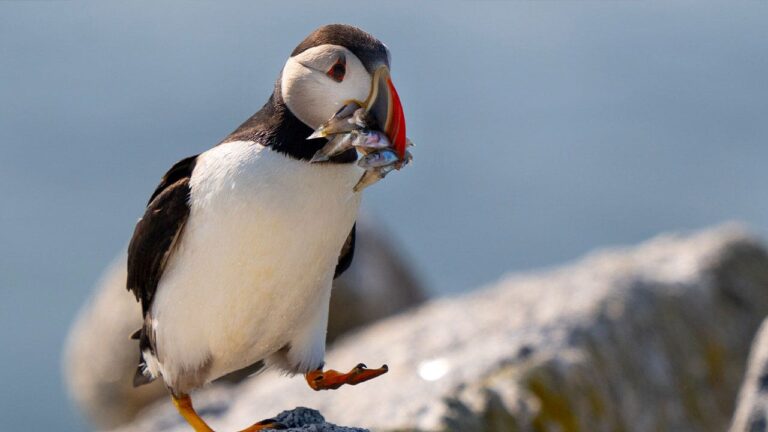Puffins Thrive Amidst Climate Change Challenges
Off the coast of Maine, on remote islands, a special bird has shown its resilience in the face of changing climates.
Puffins Bounce Back
Atlantic puffins, those comical seabirds with vibrant beaks and distinctive waddles, have managed a remarkable recovery this year. After a disastrous 2021, where their fledgling chicks faced great challenges, these birds have had a second consecutive year of success in raising their young. This surprising turn of events defies the expected impact of warming waters off New England, which were believed to threaten their food supply.
The Unexpected Savior: Sand Lance
Against all odds, the puffins’ savior was a fish named the sand lance. Don Lyons, the director of conservation science at the National Audubon Society’s Seabird Institute in Bremen, Maine, shared that the abundance of this fish has allowed puffins to thrive. This goes to show that the effects of climate change can be more complex and unpredictable than we assume.
A Sign of Hope in a Milestone Year
As the Audubon Society celebrates its 50th year of caring for Maine’s puffin colonies, the puffin population has flourished. From a mere few dozen pairs, there are now as many as 3,000 birds, and their numbers remain stable. This year’s success story reminds us of the intricacies of nature’s balance that we are still uncovering.
A Complicated Puzzle
Don Lyons emphasized the complexity of the situation, highlighting that it’s not possible to attribute their success to a single factor. Nature’s web of interactions is more intricate than we realize, and we still have much to learn about it.
From Clowns to Guardians of the Sea
Puffins, known as “clowns of the sea” or “sea parrots,” nest in burrows and feed their chicks small fish like herring. A couple of years ago, their colonies suffered a devastating reproductive season due to a lack of these fish. Only around a quarter of the birds managed to raise chicks that year.
The Climate Change Connection
Conservation groups like Audubon have linked the shortage of fish to rising ocean temperatures, particularly in the Gulf of Maine where the puffin colonies reside. The region has been warming faster than most other ocean areas. While this summer has continued to be warmer than usual, the presence of sand lance has given the puffins a much-needed break.
Resilience and Challenges
Bill Sydeman, a leading expert in marine preservation, praised the puffins’ resilience. However, he noted that the chronic nature of breeding failures due to climate change poses long-term risks to puffins and other seabirds. The impacts, from heat waves to food loss, remain significant threats.
A Unique Population
Maine’s puffins are the sole breeding Atlantic puffins in the U.S. While this population has rebounded, puffins in other parts of the world have seen declining numbers.
A History of Recovery
The journey of Maine’s puffins from near extinction to their current numbers is a testament to conservation efforts. Hunters had almost wiped them out by the early 1900s. However, dedicated individuals like Stephen Kress started relocation efforts, helping the puffins flourish on various islands.
A Glimpse of Life on the Islands
Tour boats near Eastern Egg Rock offer a delightful spectacle of puffins taking flight and diving into the water for fish. These islands, including Matinicus and Petit Manan, now provide homes for these charming birds.
A Promising Future
Despite challenges, the adult puffins appear strong, hinting at the stability or even growth of the population.
A Broader Concern
The plight of puffins sheds light on the larger issues faced by seabirds due to climate change. P. Dee Boersma, a biology professor, underscores the importance of successful breeding seasons, ensuring the survival of these precious creatures in the years to come.

